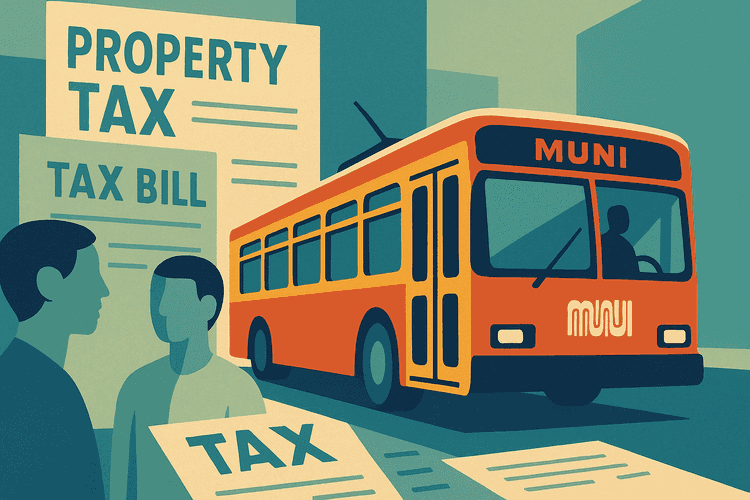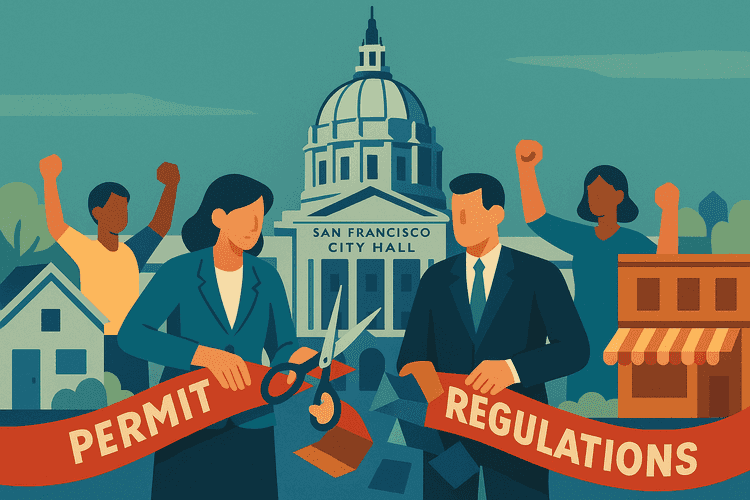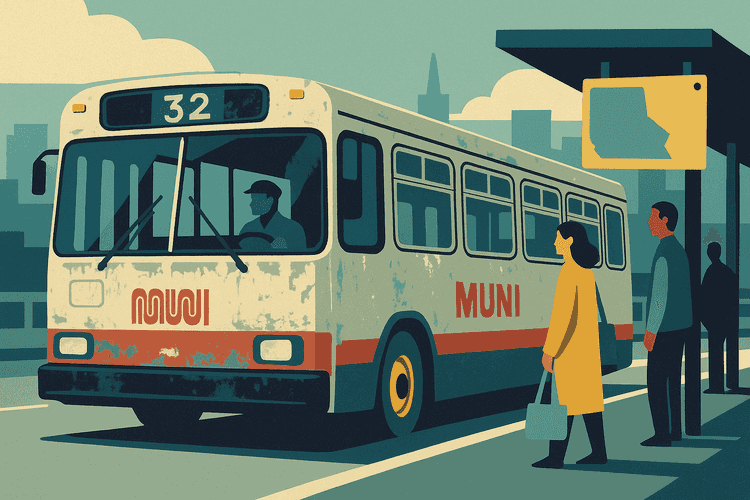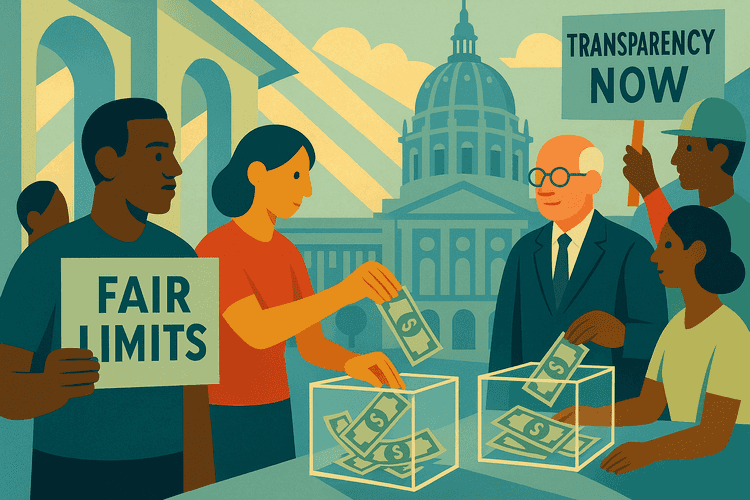Peskin Threatens "Political Warfare" Over Housing Plan
PLUS: Support the Family Zoning Plan at Planning Commission this week!
What You Need To Know
Here’s what happened around the city for the week of August 31, 2025:
- Peskin Threatens "Political Warfare" Over Housing Plan
- Send an email to Support the Family Zoning Plan at Planning Commission
- Mayor and Supes Back Property Tax to Save Muni
- Lurie Targets "Dumb Rules" with New Permit Reforms
- SFMTA Hits Fiscal Cliff, Orders System-Wide Cuts
- SF May Double Campaign Donation Limits to Keep Pace with Inflation
- Controller Places Urban Alchemy on Watchlist for Financial Concerns
Your Action Plan:
- Support Family Zoning Plan at the Planning Commission this Thursday! (Or send an email using our AI assistant)
Hiring:
- Work for the City to create an AI pipeline for tracking legislation
Peskin Threatens "Political Warfare" Over Housing Plan
Published September 4, 2025
Former supervisor rallies labor groups against Mayor Lurie's housing initiative, warning of a potential ballot fight in 2026.
The Facts
Former Supervisor Aaron Peskin is mobilizing opposition to Mayor Daniel Lurie's Family Zoning Plan, warning of "political ruin" and threatening "lawsuits and acrimonious ballot fights" over the initiative, reports J.D. Morris at The Chronicle.
The San Francisco Labor Council is set to consider opposing the zoning plan on September 3, 2025, a move that would represent a major escalation against the centerpiece of Lurie's housing agenda. According to an email obtained by The Chronicle, a local housing activist has been discussing a potential June 2026 ballot measure with Peskin and labor groups. The mayor's plan is a key part of San Francisco's strategy to meet its state-mandated goal of planning for 82,000 new homes by 2031.
The Context
The Family Zoning Plan would authorize taller, denser residential buildings near transit in areas like the Marina, Richmond, and Sunset districts. This is a direct response to the state's Regional Housing Needs Allocation (RHNA) mandate, which requires the city to demonstrate serious housing production or risk losing local control over approvals and eligibility for state funding.
If San Francisco fails to meet its housing targets due to local obstruction, the state has the authority to strip local control and take over the building permit process entirely. This would remove community input from development decisions and impose state-determined housing policies on San Francisco neighborhoods.
The GrowSF Take
Peskin's threats represent a dangerous gamble with San Francisco's self-governance. While opposing an extremely popular housing plan that would help working families afford the city, his strategy risks triggering exactly what housing opponents claim to fear: loss of local control. If Peskin succeeds in blocking housing production, the state will impose its own development rules without community input. This approach prioritizes political theater over both housing production and local democracy, potentially surrendering San Francisco's ability to shape its own neighborhoods to Sacramento bureaucrats.
Send an email to Support the Family Zoning Plan at Planning Commission
The popular Family Zoning plan is up for discussion at the Planning Commission this Thursday, September 11. We need your help to drown out the few angry voices that Aaron Peskin is using to derail the process. If Peskin succeeds, the City will fail its homebuilding commitment and the state will take over all land use in the City.
It takes just two minutes to send an email to the Planning Commission telling them you support the Family Zoning plan. Just click here to use our AI assistant to write a custom email which you can edit before sending.
California Passes SF Bills Targeting Stolen Goods Sales and Downtown Recovery
Published September 5, 2025
The Facts
On September 4, the California Legislature passed two San Francisco bills with overwhelming bipartisan support. The bills, authored by Senator Scott Wiener and sponsored by Mayor Daniel Lurie, now head to the Governor's desk. Senate Bill 276, the SAFE Streets Act, allows SF to require permits for selling commonly stolen goods and passed the Assembly 65-2. Senate Bill 395, which authorizes 20 new, lower-cost liquor licenses for downtown bars and restaurants, passed the Assembly 74-0.
The Context
These bills address two persistent problems undermining San Francisco's recovery. Stolen goods sales proliferated after the 2018 Safe Sidewalk Vending Act decriminalized sidewalk vending, creating chaotic conditions in the Mission, Tenderloin, and SOMA that forced the city to impose a temporary Mission Street vending ban in 2023. Previous efforts by Mayor Breed and Supervisor Hillary Ronen to address the problem were hampered by state law constraints—street vending legislation passed locally in 2022, and SB 925 died in the legislature in 2024, leaving the city with only temporary moratoriums as a solution. At the same time, downtown's recovery has been hampered by a nearly 80-year-old cap on liquor licenses, with secondary market licenses costing upwards of $200,000—a major barrier for small businesses.
The GrowSF Take
Incredible! Thanks to Senator Scott Wiener for authoring these bills and Mayor Lurie for sponsoring them—this state-local partnership demonstrates precisely the kind of effective governance San Francisco needs. The near-unanimous support for these bills shows that practical policies addressing public safety and economic recovery can build broad coalitions. By targeting actual bad actors while protecting legitimate vendors and creating new opportunities for small businesses, this collaboration solves real problems without creating new bureaucratic hurdles. This is pragmatic, evidence-based leadership in action.
Mayor and Supes Back Property Tax to Save Muni
Published September 4, 2025
The Facts
Mayor Daniel Lurie is backing a parcel tax ballot measure for November 2026 to address SFMTA's $320 million deficit and prevent devastating Muni service cuts, according to Joe Fitzgerald Rodriguez at The Standard. In a letter to SFMTA Director Julie Kirschbaum obtained by The Standard, Lurie called a parcel tax "the best mechanism to generate the level of funding needed to support Muni service."
Board President Rafael Mandelman and Supervisor Myrna Melgar cosigned the letter, signaling strong political support for the measure. A Muni Funding Working Group report estimates the tax could generate $85 million annually for transit operations.
The Context
This proposal directly addresses the fiscal crisis that forced SFMTA to order system-wide cuts just days ago, including 5-7% budget reductions across all divisions. The agency has already eliminated 500 positions and cut $7 million in routes this year while implementing desperate measures like limiting driver bathroom breaks.
Muni ridership plummeted during the pandemic, creating a deficit expected to grow to $434 million by 2030. Local officials view reliable transit as vital to downtown's recovery, providing access to office buildings, shopping centers, and restaurants that drive the city's economic engine.
The parcel tax is part of a comprehensive funding package that includes a regional sales tax and operational efficiencies, which together could close the full deficit.
The GrowSF Take
While Muni absolutely deserves full funding, asking voters for higher taxes in the current economic environment is risky politics that may backfire. Even if the comprehensive funding package passes, it won't prevent future crises without addressing the underlying fiscal mismanagement that created this crisis.
We support funding Muni, and expect higher taxes to be paired with better performance.
Lurie Targets "Dumb Rules" with New Permit Reforms
Published September 4, 2025
The Facts
On September 2, 2025, Mayor Daniel Lurie unveiled six new ordinances aimed at eliminating what his administration calls "dumb rules" that create unnecessary hardships for residents and businesses. The legislative package represents the latest wave of the PermitSF initiative launched earlier this year.
The six specific reforms include:
• Driveway parking ban elimination - Ends fines of up to $1,500 for parking in your own driveway, closing 123 open enforcement cases • ADU streamlining - Aligns local accessory dwelling unit rules with state law to simplify construction • Development fee reductions - Cuts permitting fees for projects valued over $100 million to jumpstart major developments
• Historic building flexibility - Eases restrictions on historic properties to help owners find tenants and continue investing • Commemorative plaque simplification - Makes it easier to install neighborhood memorial plaques on sidewalks • Excavation permit reform - Eliminates the $700 parking plan requirement that added unnecessary costs
Additional streamlining includes over-the-counter permits for restaurant renovations and expedited processes for rooftop solar panel installations, according to Laura Waxmann at The Chronicle.
The Context
These reforms build on Lurie's broader effort to modernize San Francisco's notoriously complex permitting system. Previous PermitSF initiatives have already eliminated arbitrary size limits for rooftop structures and cut superfluous requirements that added costs without improving safety.
The driveway parking reform addresses overly broad enforcement that penalized homeowners even when sidewalk access wasn't blocked. The change still protects pedestrians by maintaining rules against blocking sidewalks for wheelchair users and families with strollers. Other changes address historic building restrictions that have left properties vacant due to overly stringent preservation rules, and eliminate bureaucratic requirements that serve no public purpose.
The GrowSF Take
These reforms demonstrate the value of targeted rule-making over blanket prohibitions. While some regulations serve legitimate purposes—like ensuring sidewalk accessibility—enforcement should focus on actual problems rather than technical violations that don't harm anyone.
The broader package shows how government can eliminate barriers to housing construction and business operations without compromising public safety. Streamlining ADU rules aligns local law with state requirements, while reducing fees for major developments could jumpstart construction projects that create jobs and housing. This methodical approach to cutting red tape represents exactly the kind of pragmatic governance that San Francisco needs.
SFMTA Hits Fiscal Cliff, Orders System-Wide Cuts
Published September 4, 2025
The Facts
San Francisco's transportation agency directed all divisions to cut 5-7% of their budgets on Tuesday, reports Rachel Swan at The Chronicle, as the agency faces a $322 million deficit starting next year. Chief Financial Officer Bree Mawhorter warned staff that the cuts will affect station cleanliness, bus maintenance, and repair timelines.
The cuts come as COVID emergency funding expires. Even if planned regional and local ballot measures pass, the revenue won't arrive until fiscal year 2027—too late for the immediate crisis. Worse, the projected income would still leave SFMTA with a $100 million shortfall.
The Context
This fiscal cliff represents years of financial mismanagement. The agency already eliminated 500 positions this year and reduced service on multiple bus lines to save $7 million. Mawhorter admitted in March, "we have squeezed the fruit quite a lot—there really isn't a lot of juice left."
While SFMTA promises to preserve basic service levels, quality will deteriorate. Tire rotations may stretch from every three months to six, and broken signs and bus shelters will take longer to repair. This crisis unfolds as Mayor Lurie pushes for density increases near transit, but residents may soon find unreliable, poorly maintained buses serving new developments.
The GrowSF Take
The city deserves credit for beginning to right-size its operations—SFMTA's elimination of 500 positions shows leaders recognize fiscal reality. But these cuts aren't enough to solve the structural deficit. Rather than immediately reaching for tax increases, San Francisco should accelerate downsizing across all departments. GrowSF polling shows voters strongly prefer cutting city hall over raising taxes, and for good reason: administrative bloat diverts resources from core services like transit.
SFMTA should continue exploring reforms while exploring performance-based revenue sources like congestion pricing. This crisis demands cuts and accountability measures that tie future funding to measurable service improvements. San Franciscans will support transit investments, but the city must prove it can operate efficiently.
SF May Double Campaign Donation Limits to Keep Pace with Inflation
Published September 4, 2025
The Facts
San Francisco's Ethics Commission is proposing to double individual campaign donation limits from $500 to $1,000 for the first time since the 1980s, according to Marshall Jones at The Standard. The commission will vote on the proposal at its September 9 meeting, with implementation targeting the 2027 election cycle if approved.
The Context
The current $500 limit was originally established in 1973, raised to $750 in 1981 and $1,000 in 1983, then reduced back to $500 in 1986 and has remained unchanged for nearly four decades. If the limit had kept pace with inflation since 1973, it would now be approximately $3,640 in 2025 dollars, making the proposed $1,000 cap actually quite modest compared to what full inflation adjustments would warrant.
San Francisco's campaign finance system has created significant imbalances as donation limits stagnated while costs increased dramatically over decades. The frozen contribution limits have pushed more political activity toward independent expenditure committees and super PACs, which face no donation restrictions but are subject to stricter disclosure requirements than candidate committees.
Critics argue the higher limits will benefit wealthy candidates and donors, but supporters contend that outdated limits have already driven wealthy interests toward less transparent vehicles. The proposal comes as campaign costs have risen substantially—mailers that cost $15,000 in 2011 now cost over $25,000.
The GrowSF Take
This long-overdue adjustment makes perfect sense. Donation limits that fail to keep pace with inflation for over 50 years become effectively more restrictive over time, pushing political activity toward less transparent channels like independent expenditure committees.
We support this change even though it may reduce the relative influence of organizations like GrowSF. Transparent, accountable campaign contributions directly to candidates are far preferable to the current system that forces political activity through super PACs and independent expenditure committees with weaker disclosure requirements.
Good governance requires updating outdated rules to reflect economic reality, not clinging to arbitrary limits that no longer serve their intended purpose.
Controller Places Urban Alchemy on Watchlist for Financial Concerns
Published September 4, 2025
City oversight office flags "serious fiscal" issues at major street safety contractor, demanding accountability for public funds.
The Facts
San Francisco's Controller's Office has placed the nonprofit Urban Alchemy on a corrective action watchlist after identifying what the office called "serious fiscal or programmatic" issues, according to a report by Gabe Greschler at The Standard. An August 21 letter to the organization flagged inadequate employee time-tracking systems spanning two years and significant cash flow problems.
The Context
The Controller's Office City Services Auditor provides independent assessment of the City's $15.9 billion budget and oversees nonprofit contractors through its monitoring program. Urban Alchemy, one of the most visible, deploys formerly incarcerated "practitioners" to provide safety services in areas like the Tenderloin. The organization's revenue grew from $10 million in 2020 to $70 million in 2023. Warning signs emerged in late 2024 when the organization exceeded its budget by $500,000 in one month, leading some supervisors to question its financial management.
Despite these administrative challenges, Urban Alchemy has provided critical street-level services, including overdose prevention and naloxone distribution that have helped save lives in the Tenderloin and other high-risk areas. The watchlist requires the nonprofit to develop and implement a corrective action plan to resolve the identified issues.
The GrowSF Take
This Controller action demonstrates exactly the kind of rigorous financial oversight taxpayers deserve. When nonprofits receive substantial public contracts, they must be held to the highest standards of transparency and performance. The watchlist designation is not a punishment but a critical tool of good governance, showing that accountability mechanisms are working to protect public investment while giving organizations a clear path to fix their problems. This is pragmatic, effective governance in action.
Your Action Plan
Show up to support the Family Zoning Plan at Planning Commission this Thursday! (Or send an email)
Join pro-housing groups on the steps of City Hall to support the Family Zoning plan! There’s a rally on Thursday, September 11th at 11:30am, and at 12:30 everyone will head upstairs to Room 400 to speak up for the plan at the Planning Commission.
Aaron Peskin is up to his old tricks and is trying to kill the plan. If Peskin succeeds, the City will fail its homebuilding commitment and the state will take over all land use in the City.
If you can’t make it in person, that’s ok too! Instead, it takes just two minutes to send an email to the Planning Commission telling them you support the Family Zoning plan. Just click here to use our AI assistant to write a custom email which you can edit before sending.
Hiring
Work for the City to create an AI pipeline for tracking legislation
The City Administrator’s office is hiring a Comms & Legislative Analyst to help develop an AI-powered tool to track legislation at it moves through City Hall.
The scope of work involves researching and implementing the AI tool, analyzing legislation, managing communication strategies, conducting studies, responding to informational requests, and representing the department at public events. Specific duties for the Communications and Legislative Affairs Analyst include developing the AI tool, analyzing legislation, coordinating communication strategies, making policy recommendations, preparing reports, managing media relations, and handling public records requests.
P.S. if you have questions about how to apply to city jobs or are looking for other opportunities, email us at talent@growsf.org










